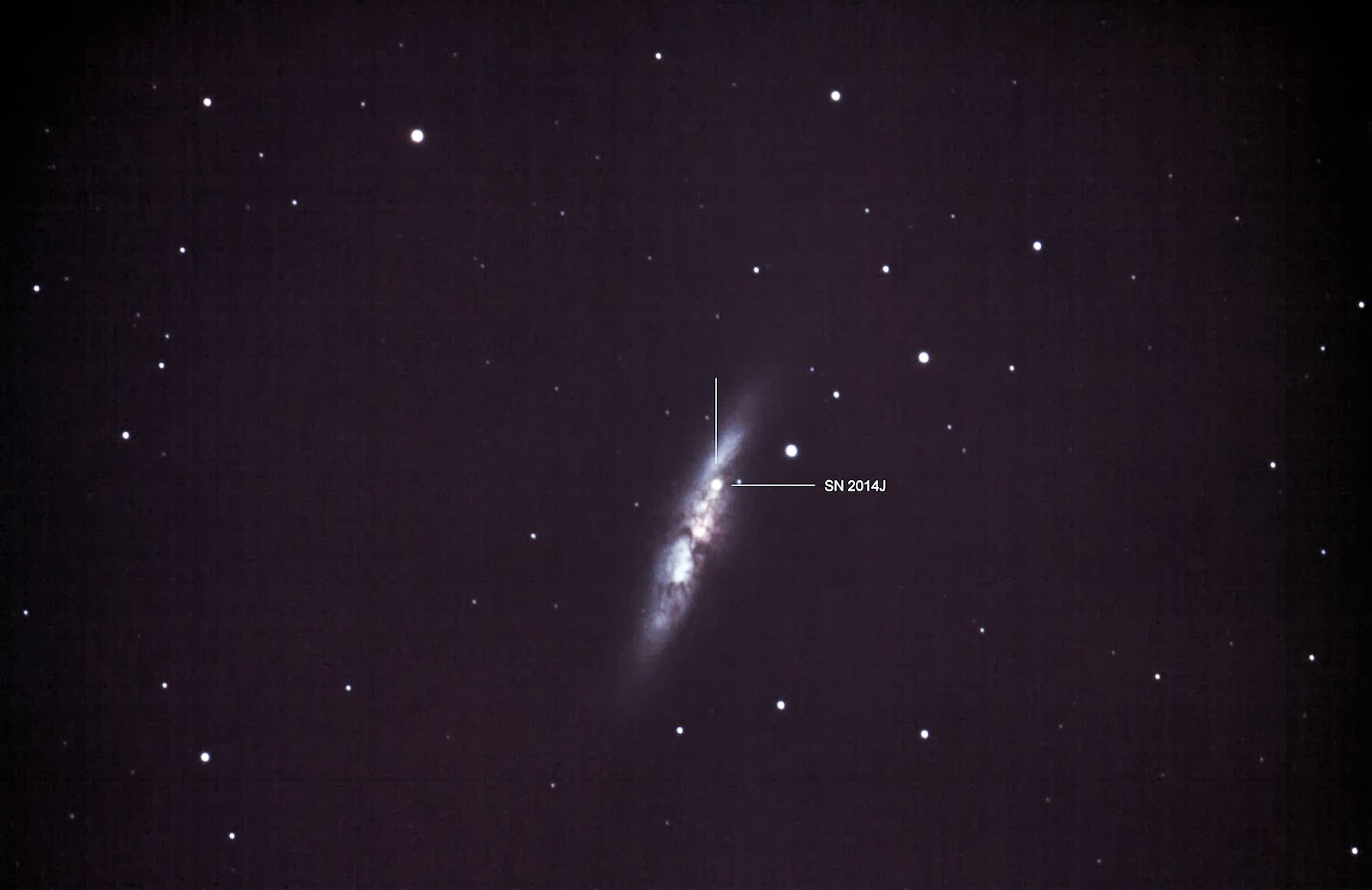Monday, February 24, 2014
Meteorite Crash on Moon - Largest Ever Recorded
Video footage of a record-breaking meteorite strike on the moon, which occurred on Sept. 11, 2013 and was unveiled today (Feb. 24), shows a long flash that was almost as bright as the North Star Polaris. Details can be found at Space.com.
Sunday, February 23, 2014
Jupiter, again
With a little more fiddling with the software, here is the same image as earlier but I was able to bring out more of the detail.
Jupiter - imaged with new camera
Got my new planetary imaging camera for the telescope on Friday, and since
the skies cleared out a bunch on Saturday, I decided to bear with the muddy
ground and test it out on the planet Jupiter. Now mind you, this is a new
camera (got to learn how to use it) a muddy backyard and the atmosphere,
although clear, was extremely unsteady.
 |
| Jupiter - February 22, 2014 9:00 PM 400 frames processed in RegiStax -- 25ms/frame - total Exposure 10sec ASI120MC on EdgeHD-11 f/10 |
Wednesday, February 19, 2014
Update on Supernova 2014J
Since it's been cloudy, snowy, rainy, and just downright not conducive to astrophotography these past few days (actually, weeks!) I decided to improve on the processing of the images I took of M82 and 2014J on Feb 7, 2014. Here is the updated photo. The lower ISO (1600 vs. 3200) reduced the overall noise and the longer exposure allowed more of the actual color of the galaxy to come out.
Recent observations have determined that the supernova is now starting to dim and is currently only half as bright as when this image was taken. When the skies clear I'll re-image and see how much SN2014J as dimmed.
 |
| M82 and SN2014J 11.25 minutes (15x45sec subs), ISO1600, EdgeHD-11 Prime Focus |
Wednesday, February 12, 2014
Galileo's Optical Illusion
Why does a light-colored object on a dark background appear larger than a dark object on a light background? It's true, and you might have had this experience yourself. In the photo above, the brighter Venus (lower dot) appears larger than the dimmer Jupiter (upper dot).
Well until recently, no one knew why. Now it seems that a neuroscientist at the State University of New York's College of Optometry may have the answer. Check out the article in LiveScience.
Well until recently, no one knew why. Now it seems that a neuroscientist at the State University of New York's College of Optometry may have the answer. Check out the article in LiveScience.
Tuesday, February 4, 2014
Venus in December
Just got around to checking out my first attempt at planetary photography. Since my DSLR couldn't be easily mounted to my eyepieces/scope, I tried my old Casio Exilim EX-Z700 mounted to a 30mm eyepiece with a Celestron camera mount. Here's the result of that effort, after throwing out about 30 images, I found one that was fairly reasonable.
 |
| Venus, 2:13 PM Dec 11, 2013 |
Subscribe to:
Comments (Atom)
A very small nebula indeed!
Minkowski 1‑8 is a tiny planetary nebula located about 13,000 light‑years away in the constellation Monoceros. Spanning only about 20 arc‑s...

-
Like in any tech field, advancements in technology, tools, and processes keep pushing the boundaries of what’s possible, and astrophotograph...
-
We had an unscheduled ' entertainment ' activity last evening (actually, early morning of the 13th). The ship ran into a fairly lar...



